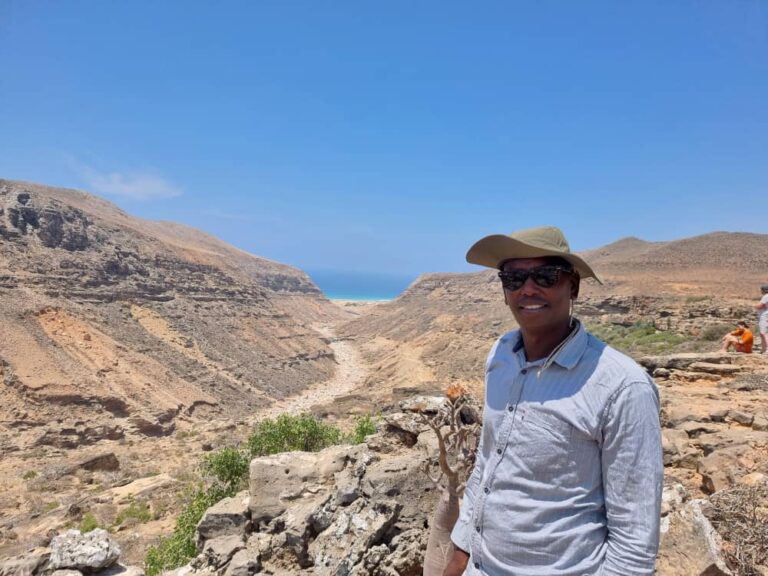Language of Socotra
What is Soqotri language?
The Socotri language, totally different from Arabic, was discovered about 160 years ago, but too little study has been devoted to it so far. The present article deals with the identity of Socotri within the framework of the Modern South Arabian languages, the Semitic Languages, and the Hamito-Semitic (or Afro-Asiatic) languages. It also tries to answer the following questions: Who speaks Soqotri? How long has Socotri been spoken? Examples are given for the purpose of comparison, and a few features of Soqotri shown, some of them are common to the entire Modern South Arabian family, and some are absolutely typical of Socotri. However, this language is in great danger of dying out. The author describes the possible process: speaking Socotri, which used to be necessary, ends up being a disadvantage. Anything that might contribute to rescuing Socotra from its insularity should be examined within careful cultural policies: social progress, development, and national solidarity should also imply an effort to protect the national cultural heritage.
The Soqotri language has been an object of scientific study for a little over a century and a half, yet very few researchers have had the privilege of studying it in the field. The first expedition to do so was the South Arabian Expedition (Sudarabische Expedition) from the Vienna Academy of Science (Austria) in 1898 with David Heinrich Müller at its head. All of these efforts resulted in a series of impressive works between 1902 and 1907, to which was added, in 1938, the Lexique Socotri by Wolf Leslau. The second linguist to go to Socotra was T.M. Johnstone in 1967, who was the best among the specialists in Modern South Arabian languages, but who unfortunately passed away prematurely. Lastly, another very important visitor to Socotra since the 1970s was Vitaly Naumkin, a Soviet anthropologist with undeniable linguistic talents since he is, to the best of my knowledge, the only Westerner to have succeeded in speaking Socotri fluently. And eventually the French team, which included Mrs. Simeone-Senelle, visited in 1985.

Who speaks Soqotri ?
Socotri is spoken by Soqotri people only on the island of Socotra and the neighboring islands of Abd al-Kuri, Samha, and Darsa, not being inhabited, all the inhabitants of these islands are Socotri speakers, whether native to the island or originally from the continent, with some Arabic families. In many families which came from Africa, the Alnooby family or Mahra, Socotri, which was originally a second language, has become the first language.
Socotri can obviously be heard in other places where there are settled Socotri communities which never broke off their ties to the island. This is especially the case in two communities: In some of the Emirates, Socotri soldiers have been used from time immemorial in the Police and Customs, the kinds of forces which require dependable, courageous, and disinterested men. Off the Hadramout coast, in Qusayir and Musayna, a large number of fishermen from Abd al-Kuri have permanent or seasonal residences, and there are many ties by marriage between the inhabitants of Abdul Kuria and certain communities in Qusayir and Musayna as well as with certain communities in Socotra.
How long has Soqotri been spoken?
We can assume that the core population which brought the Socotri language settled on the island 3000 years ago and came originally from southern Arabia. This was most likely one of the consequences of the retreat of the indigenous population of southern Arabia who fled the advance of the Sabaeans. As for the Greek group mentioned in the Arab sources and in some Western ones, they left no discernible traces in the population, its culture, or its language, no more so, actually, than the Portuguese group did if we exclude certain legendary stories which, in any case, revolve around certain individuals only.
👉🏽 Click here if you want to know more about Socotra’s History.
Anthropologists find traces of these diverse contributions to the population in the morphology of Socotri, but on the linguistic level, it is not possible to find proof of any determining influence on Socotri from foreign languages, with the exception of Arabic; however, this influence is recent, is not generalized, and still superficial.
What gave Socotri its distinctiveness, in relation to that of its origin, was first and foremost, its isolated development, protected as it was from outside contact by the sea, a harsh climate, and easily defended mountains.
Ready to visit Socotra?
Let’s get in touch!
Adnan, ready to make your journey unforgettable.

